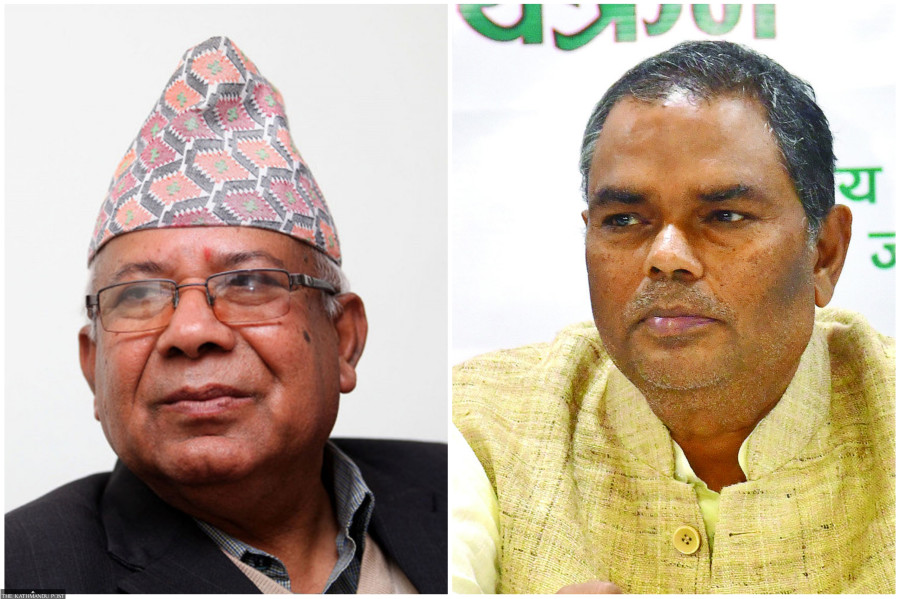National
Name dispute at JSP-Unified Socialist merger talks
Unified Socialist wants to include the term 'communist' in the new party's name, but Janata Samajbadi Party is insisting on using 'socialist' instead.
Nishan Khatiwada
The task forces of the Janata Samajbadi Party and the CPN (Unified Socialist) formed to negotiate a unification between the two parties met on Thursday.
Soon after the November election results were out, both the parties had begun talks on the possibilities of a unity between the two organisations. They are trying to clinch an agreement on the party ideology, party name and leadership, say the leaders involved in the bilateral negotiations.
The Unified Socialist General Secretary and a member of the taskforce, Beduram Bhusal, said they were in the preliminary discussions and their meeting On Thursday had lasted around an hour. “We have not reached any conclusion. We discussed the issues related to party ideology, structural issues, leadership, and a name for the new party,” he said.
Janata Samajbadi leader and another task force member Rajendra Shrestha echoed Bhusal’s sentiments, saying they had held preliminary discussions on how they could proceed together. “The main motive behind our efforts is to strengthen the socialist movement, as the identity of both the parties are associated with socialism,” he said.
Speaking on the condition of anonymity, a Unified Socialist central committee member said talks for unification have failed to gather momentum as differences have already surfaced regarding the name of the unified party.
“We have asserted that the term ‘communist’ should be included in the name, while the Janata Samajbadi Party leaders have been insisting on using just ‘socialist’ arguing that the term covers the essence of communism,” the leader said.
According to the committee member, Janata Samajbadi leaders are not fond of the term ‘communist’ and want to avoid it in party name.
The task force of the Janata Samajbadi Party has Rajendra Shrestha, Rakam Chemjong and Govinda Chaudhary, while the Unified Socialist’s has Beduram Bhusal, Bijaya Poudel, Gangalal Tuladhar and Prakash Jwala, as members.
Bhusal, the party general secretary, also did not sound fully confident about the possibility of a unification.
“We can’t say for sure whether the parties will merge just based on one or two meetings,” said Bhusal.
The Maoist Centre and the Unified Socialist were earlier part of a Nepali Congress-led ruling coalition and fought the November elections together. But when Maoist Centre chair Pushpa Kamal Dahal suddenly pulled out of the alliance and joined hands with KP Sharma Oli, Unified Socialist chair Madhav Kumar Nepal was left behind.
According to insiders, pressure is also mounting on the Unified Socialist to merge with the CPN-UML, as some leaders are repeatedly emphasising on it. A few months before the general elections last year, Maoist Centre chair Dahal and Unified Socialist chair Nepal had decided that their parties would contest the elections with a common manifesto. But the idea proved to be short-sighted and was abandoned.
If the Janata Samajbadi and the Unified Socialist parties merged, they would become the fourth-largest force in parliament with the Janata Samajbadi Party’s 12 seats and Unified Socialist’s 10 seats, bigger than the Rastriya Swatantra Party, which has 20 seats. The Janata Samajbadi Party earned a national party status after the last major polls, but the Unified Socialist failed to gain the status.
To become a national party, a party must secure three percent of the total valid votes cast under the proportional representation system and win at least one seat under the first-past-the-post electoral system. The Unified Socialist won 10 seats in the direct elections, but failed to garner three percent proportional representation votes.
Political analyst Rajendra Maharjan said that the poor election results have brought these two parties closer. “They want to become a large political force with a stronger presence in Parliament,” Maharjan told the Post. “But it remains to be seen how they will adjust their agendas and ideologies.”
According to Maharjan, recent alliances among the parties were based on practicality, completely sidelining the principles and ideologies. This raises doubts over their sustainability.
“Even if these two parties are unified, questions over their sustainability would remain,” Maharjan added.




 8.67°C Kathmandu
8.67°C Kathmandu















